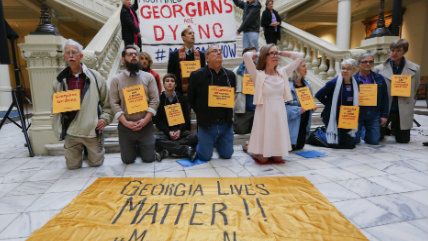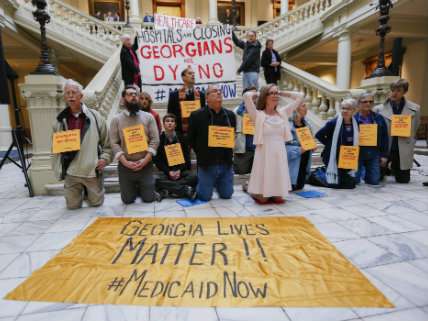The Problem With Block Grants
The block grant provides an opportunity for government spending unconnected to the act of revenue-raising.


Obscured amid the controversy over crowd size and the women's march that followed was the substantive policy at the heart of President Trump's inaugural address.
That came in the language about "we are transferring power from Washington, D.C., and giving it back to you, the people," and is being followed up with a reported congressional initiative to turn Medicaid, the federal healthcare program for the poor, into "block grants to the states."
States already exercise substantial discretion over Medicaid. Even the name of the program varies from state to state—Medi-Cal in California, DenaliCare in Alaska, MassHealth in Massachusetts, TennCare in Tennessee. The states already put some money into funding the programs. And it may be that the proposed changes are an improvement over the current system. Local control puts decisionmakers closer to end-users, shortening the distance that information needs to travel, and making it easier to adjust programs to local circumstances.
There's a back-story here. Republicans have loved the idea of "block grants to the states" since at least the 1990s, when the Newt Gingrich-led Congress reformed the welfare program known as Aid to Families With Dependent Children. Before that (and some would say, even to this day), the question of which decisions got made in Washington, and which in state capitals, had become unfortunately clouded by racism, as the Southern states refused to comply with their obligations under the Constitution.
But amid the present push to devolve power to state and local governments, it's worth remembering that there are some drawbacks, too. First of all, "block grant to the states" still often gives the politicians in Washington and their lobbyist hangers-on ample opportunity to play a role in directing the cash flow. There are almost always conditions imposed on how the money can be used, and there's almost always a formula involved in how the money is allocated. Both the conditions and the formula allow room for an awful lot of Washington-based mischief making and influence peddling.
At the state level, meanwhile, the "block grant" provides an opportunity for government spending unconnected to the act of revenue-raising. It's practically free money, so the state and local officials want to spend—they use words like "capture"—as much of it as possible. Even worse, while state and local laws usually mandate balanced budgets, the federal government can rack up plenty of debt, so the block-grant mechanism is a way for state and local politicians to circumvent their own budget constraints.
The overall effect is to encourage government spending that wouldn't otherwise happen. One way to understand this is to do a thought experiment. The next time some Republican politician starts talking about turning a federal program into "block grants to the states," ask: What would happen if instead of turning it into "block grants to the states," the politicians just flat-out eliminated the program, and cut taxes and borrowing by the amount that had been spent?
Perhaps some state or local governments would restart the program at the state or local level, or provide the service on their own, with some new revenue stream. Perhaps some other state or local governments would choose not to provide the service. Perhaps the for-profit or nonprofit private sector would provide solutions to whatever need had been met by the federal government program. If the service or program were important enough, perhaps individuals or businesses would choose to move to a state, city, or town where the service was being provided.
One might object that there are some rights or services so basic that one's ability to access them shouldn't depend on where one lives—they should be guaranteed to all Americans. The "rights" part of that is what some of our Constitution is about. And the idea that, say, your Social Security retirement benefits would depend on what state you live in runs counter to 21st Century America, which is nationalized by forces such as airplane travel, television networks, and national retail, hotel, and restaurant chains.
I'm not saying we should get rid of the whole federal government and leave everything to the states. What I am saying is that, in the debate over federal programs, in the choice between "keep things as they are" and "block grant it to the states," there's a third option, which is "get rid of the program altogether, and if some state or town or county or city wants to tax its people to have the program, good luck to them." If Trump really wants to fulfill his inaugural promise of transferring power from Washington, D.C. to the people, he'd be wise to keep that third option on the table.
Editor's Note: As of February 29, 2024, commenting privileges on reason.com posts are limited to Reason Plus subscribers. Past commenters are grandfathered in for a temporary period. Subscribe here to preserve your ability to comment. Your Reason Plus subscription also gives you an ad-free version of reason.com, along with full access to the digital edition and archives of Reason magazine. We request that comments be civil and on-topic. We do not moderate or assume any responsibility for comments, which are owned by the readers who post them. Comments do not represent the views of reason.com or Reason Foundation. We reserve the right to delete any comment and ban commenters for any reason at any time. Comments may only be edited within 5 minutes of posting. Report abuses.
Please to post comments


Block grants with relatively few strings attached are still better than the current Medicaid program.
I dunno what really counts as "substantial discretion over Medicaid", but I've been part of a couple of Medicaid waiver requests, which is how states get permission to do things that aren't already explicitly allowed by Medicaid. It sure didn't feel like substantial discretion to me.
No federal money going to the states is obviously the ultimate goal. The road there is likely to go through block granting with fewer and fewer strings attached.
My gut instinct is that converting the whole medicaid budget ti five dollar bills and it-dropping them across the country wold constitute an improvement.
It looks like a good start to reducing the Fed's influence on non-governmental issues.
The core problem with block grants is that they go to block heads.
Step one.
Then, to give states time to decide on their own how much they really like the program, cut the amount of the block grant by a defined percent each year. The states can raise their own taxes to cover the parts they really like, and dump the ones they do not like. Real local control requires real local funding.
Another side to this is to eliminate the strings on the grants.
The best part of work is from comfort of your house and get paid from $100-$2k each week. Start today and have your first cash at the end of this week. For more info Check the following link
+_+_+_+_+_+_+_+_+ http://www.moneytime10.com
I was really shocked about that issue firstly. The main point is that such policy goes against the civil society. I have read a lot about humans` rights because it`s all connected with my writing at https://ca.edubirdie.com/custom-essay-writing site. Such problems should be shown to the great public and analyzed for better understanding.